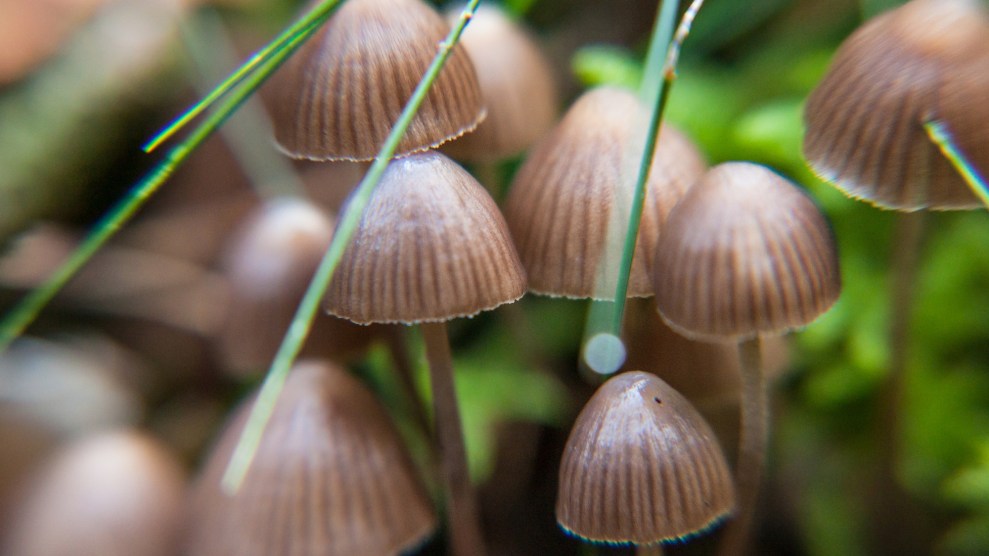
Mother Jones illustration; Psychedelic Science 2023
Perhaps it was foolish of me to assume that Aaron Rodgers’ keynote talk at last week’s Psychedelic Science 2023 conference in Denver—titled “How Psychedelics Can Unlock Elite Performance”—would touch on any actual neurological mechanisms at play. I had guessed that it might delve into the complex, controversial, but real science of how psychedelics can help athletes, both during their careers and, maybe more importantly, after.
What I heard instead was an hourlong paean to the healing power of ayahuasca, moderated by supplement brand founder Aubrey Marcus and delivered to a half-full auditorium that cheered when Rodgers said that his psychedelic journeys allowed him to unlock his purpose. Psychedelics might actually have the power to help athletes heal, both physically and mentally. But Rodgers, a four-time NFL MVP, focused more on the ways that this “medicine” allowed him to love himself than on how it actually works.
The conversation danced around Rodgers’ rejection of an actual, scientifically-backed form of medicine: vaccines. At one point, Marcus praised Robert F. Kennedy Jr., the Democratic presidential candidate and promoter of the debunked claim that vaccines cause autism. “I just see someone who’s sharing the truth from his heart,” Marcus said, “like a real guy, like a real dad, real guy, a real person who’s sharing from his heart.” (A man sitting behind me said, “Fuck that,” and walked out of the auditorium.)
Later, Rodgers, who reportedly has refused to be vaccinated for Covid, explained that psychedelics allowed him to stand up to the critical voice in his head, which said things like, “You’re not good enough. You’re not gonna win this game. Nobody likes you. You’re a crazy anti-vaxxer.” Here, the audience laughed.
In the hands of a more critical moderator, Rodgers might have been able to offer real insight into the links between psychedelics and athletic performance. Instead, he and Marcus sang the praises of drugs that very little scientific evidence actually supports, while flirting with some very unscientific ideas about vaccines.
The conference, hosted by the nonprofit Multidisciplinary Association for Psychedelic Studies, aimed to legitimize scientific inquiry into psychedelics and hosted some serious talks about placebo-controlled trials of the use of such drugs to treat various mental illnesses. But I wasn’t the only person unnerved by the conference’s decision to mix publicity and science. “Any kind of overselling is not good for science because science should be accurate rather than pushing things,” historian of science Nicolas Langlitz told the Associated Press. “It’s a tradeoff. (The conference) generates interest, it generates ultimately more research, even though the research might be skewed toward positive results.”
Psychedelics will likely have a place in medicine going forward, and in sports medicine specifically. It’s certainly worth taking seriously anything that can help athletes battered by injury. And maybe it’s even performance-boosting. Despite some journalists’ skepticism, Dock Ellis famously claimed that he was tripping on LSD when he pitched a no-hitter in 1970. (“Richard Nixon was the home plate umpire,” he recalled.)
But Aaron Rodgers and anti-vaccine chatter don’t help. “I would just try to keep my mind open to the possibility that in retrospect we will tell a very different story from the one that the protagonists of psychedelic therapies are currently predicting,” Langlitz told AP.














